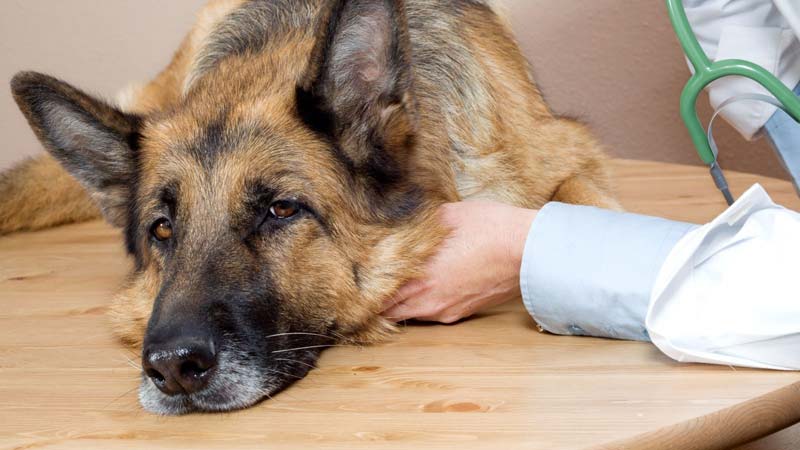- Size
- Smallest
- Small
- Small to Medium
- Medium
- Large
- Giant
- Characteristics
- Smartest
- Hypoallergenic
- Fluffy
- Best Guard
- Best Family
- Best for Kids
- Low Shedding
- Healthiest
- Police Dogs
- Most Calm
- Quietest
- Color
- White
- Black
- Grey
- Brown
- Blue
- Red
- Coat
- Hairless
- Short
- Long
- Origin
- Japan
- China
- Australia
- Germany
- Italy
- United States
- France
- Group
- Hound
- Terrier
- Herding
- Toy
- Working
- Sporting
What Causes Vestibular Disorders in Dogs?

Imagine trying to balance and move without a stable sense of gravity or coordination. Dogs, much like us, rely on a complex system in their inner ears and brains to stay steady on their paws. When something goes haywire in this system, it can cause what's known as a vestibular disorder—a fancy term for balance problems in dogs.
Figuring Out Vestibular Disorders
The inner ear and brain work hand-in-hand to help dogs keep their balance and know where they are in space. But sometimes, things can go wrong, leading to what vets call a vestibular disorder. It's like a glitch that makes it tough for dogs to stay steady on their feet or even just sit without feeling dizzy or disoriented.
Triggers Behind Vestibular Disorders
Here are some things that can mess with a dog's balance system:
Ear Infections: Infections or inflammation inside a dog's ear can mess up those important sensors that help them stay balanced.
Tumors or Cysts: Growth of lumps in the brain or along the nerves connected to the balance system can squish or press on the important parts, causing balance issues.
Trauma or Injuries: Just like in humans, a hit to the head or a serious injury can disrupt how a dog's brain handles balance.
Hypothyroidism: Sometimes, when a dog's thyroid gland isn't working right, it can affect their balance, though this isn't too common.
Vascular Accidents or Strokes: In rare cases, problems with blood flow to the brain can mess up a dog's balance system.
Mystery Cases: Weirdly, sometimes dogs have balance issues, and vets can't pinpoint a specific cause. It's like a mystery glitch—vets call it idiopathic vestibular syndrome.
All these different triggers can mess with various parts of the balance system in a dog's body, like the inner ear, brain, or the nerves in between. And when these areas don't work as they should, dogs end up showing those wobbly or dizzy signs that we notice.
Treatment Approaches
Knowing what could be causing a dog's balance issues is super important. It helps the vet figure out the best way to treat or manage the problem.
Treatment strategies vary based on the identified cause:
Idiopathic Vestibular Syndrome: Often resolves spontaneously with supportive care and medications to alleviate vertigo and nausea.
Trauma Cases: May require surgical intervention or intensive care during the recovery phase.
Hypothyroidism: Involves thyroid supplementation and supportive care to manage symptoms.
Ear Infections: Treatment with topical and oral medications, often involving the removal of debris under anesthesia.
Tumors or Cysts: Advanced imaging followed by surgical or therapeutic interventions like chemotherapy or radiation.
Prognosis and Recovery
In most cases, dogs with idiopathic vestibular disease can live their full lives despite experiencing this condition. Once they've bounced back from it, many go on to lead perfectly normal lives, even though they might carry a few reminders like a slight head tilt or the occasional bout of nausea. This vestibular hiccup doesn't usually cut short a dog's life expectancy or hold them back from enjoying their doggy adventures. With the right care and a little patience, they're often back to wagging tails and exploring the world around them just like before.
However, outcomes for dogs with other causes depend on the efficacy of treatment. Conditions like hypothyroidism or ear infections often have positive prognoses with proper medication. Conversely, strokes, tumors, or severe trauma may lead to more challenging recovery paths.
Prevention and Management
Preventing vestibular disease entirely is challenging, but maintaining regular ear cleaning for dogs prone to infections and scheduling routine veterinary check-ups aids in early detection. Swift veterinary attention upon symptom observation is paramount for effective treatment and ongoing management of the condition.
You May Also Like
 Dog HealthCan humans Get Parvo from Dogs?
Dog HealthCan humans Get Parvo from Dogs? Dog HealthHow Long Does It Take A Dog To Show Signs Of Parvo?
Dog HealthHow Long Does It Take A Dog To Show Signs Of Parvo? Dog HealthVaccines for Dogs: Here's Everything You Need to Know About It
Dog HealthVaccines for Dogs: Here's Everything You Need to Know About It Dog HealthWhite Foam Vomit of Dogs: Why Does This Happen?
Dog HealthWhite Foam Vomit of Dogs: Why Does This Happen? Dog HealthCan I Give Human Amoxicillin To My Dog?
Dog HealthCan I Give Human Amoxicillin To My Dog? Dog HealthWhat Happens If A Dog Eats Amoxicillin?
Dog HealthWhat Happens If A Dog Eats Amoxicillin?